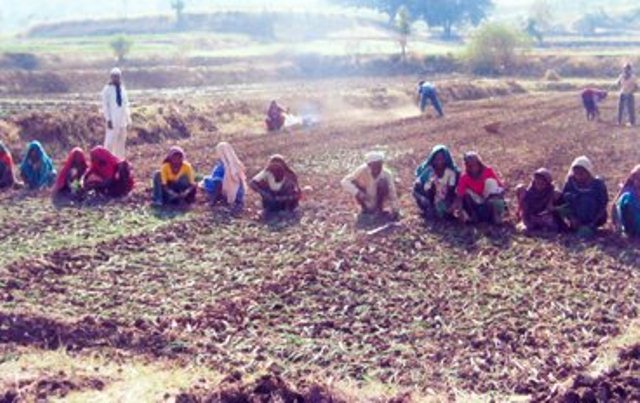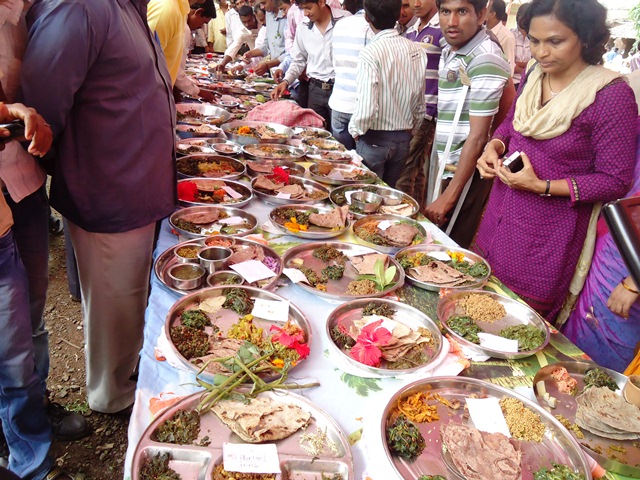7 mins read
A village that Transformed its own Destiny
Baripada | Maharashtra

This is the story of a village that rewritten its own destiny. This tribal village of only 94
families in Sakri Taluka of Dhulia district of Maharashtra, has proved that if
humans befriended the nature, then its scarcities can be eradicated forever. It
is the result of the organized efforts of the villagers of Baripada, once yearning for even a drop of
water, today, providing drinking water to five nearby villages. A village
where once only 15 hectares of land was cultivable, today 120 hectares of land is being cultivated in three crop cycles.
Owing to cash crops like Onion, Pulses and Strawberry no family is now poor in
this village. Chaitram Pawar, a postgraduate youth of the village is the architect of the change. With the
inspiration and cooperation of Vanvasi Kalyan Ashram, this change
started with the conservation of the forest.
The villagers and the forest department jointly restitute its greenery to the
forest, spread across 450 hectares, around village
Baripada. This endeavour alone has opened the doors of prosperity for this
village, along with the name and fame associated with the India Bio-Diversity
Award, and the United Nations Development Program award in 2003. In
totality, the village has been honoured with 33 awards.
Moving back to the eighties this village of
Kokana and Bhil tribes used to run out of water soon after Diwali. At that time
there were only two wells in Baripada which used to dry up completely by the
month of December, and the people of the village used to migrate for six months
in search of employment. Even when they stayed in the village, they could not
survive by farming alone, and hence Illegal businesses like chopping forest wood or selling Mahuva
liquor were their sources of income. Most of the women were involved in it.
Dr. Anand Phatak, a Pracharak of the Sangh,
who for eight long years managed the medical center of Vanvasi Kalyan Ashram
situated in Warsa, five km from Baripada village, says that "No child of
the village could ever study continuously, owing to fact that most people lived
in the village only for six months." To cook food Women had to bring fire
wood from miles away, and the villagers had to dig pits in the dried river bed
to collect water and were compelled to use that water only.
The change occurred when, Chaitramji and Dr. Anand, along with the workers of Kalyan Ashram were able to convince the villagers that the crop of development does not grow on the land of destruction. Once convinced the Vanvasi villagers befriended the forest, and started working hand in glove with the forest department to save the forest wealth. Chaitram ji says that "The elderly people of the village, took the responsibility of guarding the forest in turns. To stop illegal cutting the villagers decided and started recovering the different amount of penalties, from head loaders, and bullock cart transporters of the forest wood.

This was just the beginning, then the people
of the village did not look back. Then was the turn to bring water to the
village. With the help of the Forest Department, the Vanvasi villagers
themselves made small check dams for water conservation by way of shramdaan. In
last 30 years, about 600 numbers of
watershed management works were completed by villagers. As a result, today
there are 40 wells in the village, in which water remains
throughout the year. Not only this, the village committee also made it
mandatory for every family, to send their wards to school or to pay the fine.
To avoid the fines, children started attending regular schools opened by
Government.
In order to make women self-reliant, fifteen
self-help groups of village women were formed, under the guidance of the
workers of Vanvasi Kalyan Ashram. Fish farming was started in the village pond.
Farmer Producer Company was formed to market the famous rice of Baripada, which
now supplies this rice to the surrounding districts. In the village where
people did not even pass the fourth standard, youth like Sunil Pawar and
Abhimat Pawar are educated and are now teaching in government schools.
The "Vanbhaji Mahotsav" of Baripada a unique festival, often remains in the local headlines for the last 18 years. This is a unique example of knowledge transfer from generation to generation. Shaileshji Shukla, who pursued his PhD in Canada, came here to study; and he developed this idea of Van Mahotsav. In this a cookery competition is organized and the women participating in the competition have to tell about the medicinal properties of the vegetables, grown in the forest and used in the recipe.

Today, when Chaitram Pawar proudly says among
the villagers that "You are the owner of many crores", appears
surprising, but the forest wealth of this vast forest of Baripada, which
includes hundreds of teak wood trees, is really worth this much. Today teak
wood cutting is prohibited, but when in future they would cut the trees, then
the villagers will get 50 % cost of the wood, as per the
rules. Yes, one more thing Dr. Anand Phatak does not forget to mention proudly,
that, in a country where men hesitate to undergo family planning operations even
today, in this village, most of the men have gone through this operation.
Contact :- Chaitramji Pawar Baripada
Mobile Number :- 9823642713
Writer
Mani Chaturvedi Sharma